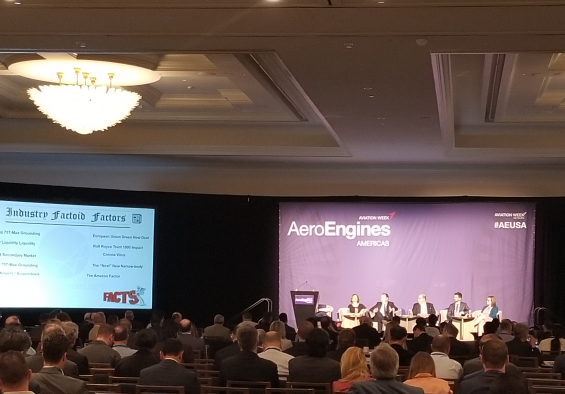Headline News | News
Airline Division Attends Aero Engines Americas Conference

Teamsters Airline Division International Representative Chris Moore attended the Aero Engines Americas Conference in Miami on February 4 and 5 as part of the Airline Division’s continued strategy to stay on top of industry trends for the benefit of our membership.
“We are committed to working with not just the companies that employ our members, but everyone throughout the industry to ensure that we address the issues affecting all of us in aviation,” said Capt. David Bourne, Teamsters Airline Division Director.
Oliver Wyman Management Consulting gave a brief industry update on the state of the engine maintenance, repair and operations (MRO) industry. Based on their research, the number of engines worldwide has increased from 57,000 to 80,000. Their conclusion was that the Engine MRO business –both original equipment manufacturers (OEM) and third parties – looks good for the foreseeable future, but there are some hurdles that will need to be overcome. The most prominent of these are a shortage of skilled labor and the lack of used serviceable material, which is being driven by the Boeing 737 MAX grounding.
Capacity constraints are also a big part of the problem. The work is there but the lack of available skilled labor is still an issue. Finding young people in the United States who are willing to work in the shops that repair blades and overhaul engines is proving difficult. Worker poaching is rampant, with some leaving for as little as a dollar an hour, proving that these companies have not provided a career path that will entice their work force to stay long term. The problem is even worse at foreign MROs.
The 737-Max was part of every panel discussion throughout the event. The grounding of that fleet has resulted in airlines postponing aircraft retirements, which has in turn led to less used serviceable material (USM) available to use in engine repair and overhaul, thus driving up the cost of spare parts.
On the more positive side, gains in fuel burn and emissions control have been on a downward trend for decades now with more improvements coming online in the future. Biofuels are becoming more widely used. Battery technology is still not at a level that would allow a for propulsion of large commercial aircrafts, but hybrid electric propulsion systems are being developed. The industry is committed to reducing carbon emissions.
Robot and Cobot repairs are part of a new wave in some intricate repairs such as combustors and new 4D inspection techniques. These may allow for an inspection that will provide a result that will not only show tolerances but also indicate the continued performance of a blade.
The future looks bright for the engine and propulsion industry and those who choose a career in it.